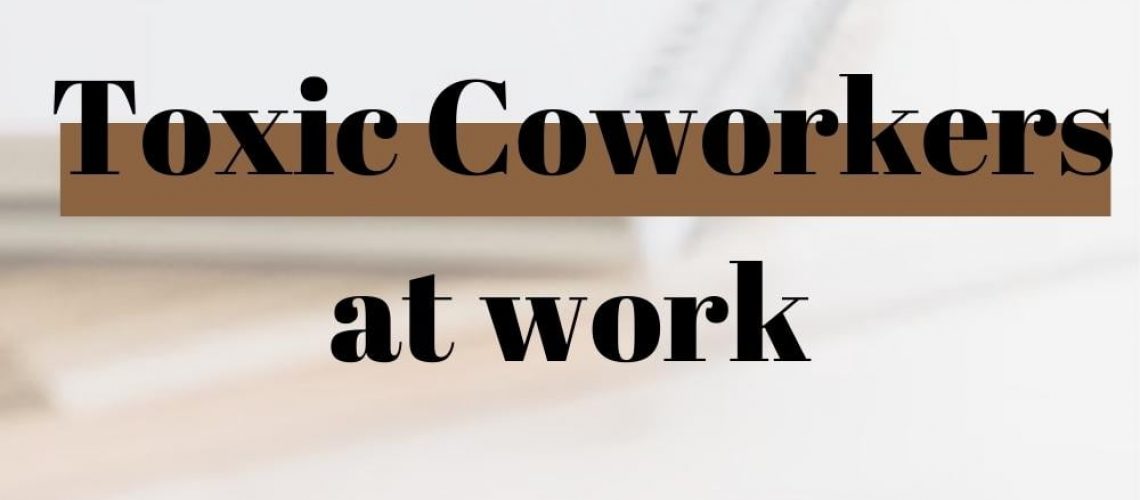Can you Handle the Toxic Coworker?
Strategy to deal, A toxic work environment is not just bad for the employee’s mental health, it also has a negative impact on their physical health. There are many reasons why people become toxic coworkers and the reasons can vary depending on the person.
The first step in dealing with a toxic coworker is to understand what kind of person they are. Toxic coworkers come in various shapes and sizes; some may be passive-aggressive while others are more aggressive or passive. This will help you to deal with them better as you will know what kind of approach to take to handle them accordingly.
Do not ignore the toxic person in the corner, you always have control.
It is important to know what is considered toxic behavior and how it can affect your mental health. A toxic person will often use manipulation, intimidation, or other forms of abuse in order to control their co-workers.
The best practice for dealing with a toxic coworker is to first understand the root cause of their toxicity. Once you have identified the issue, it’s time to address it and make sure that they are not abusing your kindness.
Remember that you always have control over how you want to deal with a toxic person on set.
Assertiveness: The answer against toxic partners
Regarding how to show an assertive attitude, “not necessary to be aggressive, but neither is it necessary to be passive ”.
- Regulate emotions without losing calm to avoid destabilizing ourselves.
- Express what we feel at the right time and place following the assertive scheme :
– Clearly indicate the situation, indicating the objective facts.
– Explain the consequences of this situation.
– Ask for a specific behavior change.
- Set clear limits; indicate the consequences of the continuation of the other person’s behavior. For example: “If you talk loud to me, I will not follow this conversation.”
- Transfer the facts to the superior so that he can intervene.
Tips so that toxic relationships do not affect you
From the first moment an uncomfortable situation is detected, it is necessary to empathically ask the other person what is happening and if there is something we are doing wrong to prevent future behaviors that require further intervention. However, it is inevitable that work environments with toxic colleagues influence both mood and work performance.
To avoid this, do not give too much importance to these people and focus attention on other aspects such as the work environment, the work we do and that we like, as well as those co-workers who are friends. “Furthermore, if we manage to set limits, not get into their game, have confidence in ourselves, and limit our encounters with that person as much as possible, we can manage to ignore them and be calm and in balance”.
Disconnect when leaving work, do relaxing activities or activities that you like, and not take problems home, so as not to give more importance than necessary to these people outside the workplace.
How to control negative feelings?
The discomfort caused by toxic relationships at work generates, among other emotional problems, anxiety, stress, and frustration. Both experts emphasize the importance of valuing the positive aspects that our employment brings and trying not to take these problems to the personal sphere.
At this point, focus on self-care through these guidelines:
- Do not act impulsively because on many occasions instead of solving the problem, you can generate new ones.
- Learn abdominal or deep breathing techniques, as well as related techniques to stay calm.
- Express the discomfort appropriately, channel it towards some activity, for example, sports. We can also look for a support person, to whom we can tell things, preferably not from the work environment or at least not put them in an uncomfortable situation if they are a partner of the person with whom we have that toxic relationship to avoid spreading the situation and generate sides.
How to control negative feelings?
Again, an assertive attitude will be required for conflict resolution: “Being able to say what you think, feel, want, or need without fear of offending others.” This will lead you to establish boundaries that will allow you to maintain control of your situation and feel good about yourself.
In this regard, empathizing with those with whom we disagree, avoiding labeling them for specific actions, and analyzing what we are doing to ensure that this toxic work culture is maintained and acting in a different way are all important.
